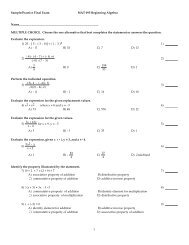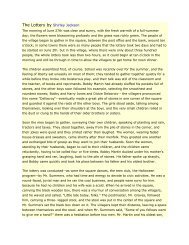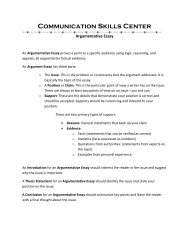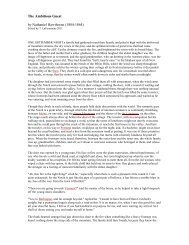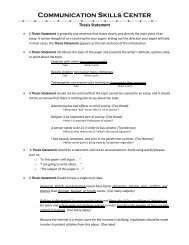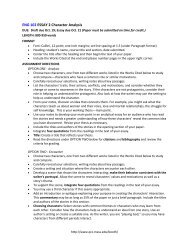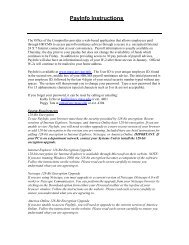Chapter 1b: Defining the Sociology of Gender
Chapter 1b: Defining the Sociology of Gender
Chapter 1b: Defining the Sociology of Gender
Create successful ePaper yourself
Turn your PDF publications into a flip-book with our unique Google optimized e-Paper software.
Kramer <strong>Chapter</strong> <strong>1b</strong>
Views gender as<br />
socially<br />
constructed<br />
Pursues<br />
questions about<br />
social structure<br />
Understands<br />
social life as<br />
gendered<br />
Examines<br />
gender at all<br />
levels <strong>of</strong> analysis<br />
Focuses on <strong>the</strong><br />
impact <strong>of</strong><br />
socialization
•Way in which a society is organized into<br />
predictable relationships<br />
• Occupying <strong>the</strong>se positions shapes how we think<br />
and act and what resources we have access to<br />
Statuses Roles Groups<br />
Institutions<br />
Culture
Beliefs<br />
Behavior<br />
Culture or<br />
Subculture<br />
Material<br />
objects<br />
Symbol<br />
(language)
Socialization<br />
Anticipatory<br />
socialization<br />
Resocialization<br />
The process<br />
through which<br />
one learns<br />
how to act<br />
according to<br />
<strong>the</strong> rules and<br />
expectations<br />
<strong>of</strong> a particular<br />
society.<br />
Occurs when<br />
individuals are<br />
preparing for <strong>the</strong><br />
statuses <strong>the</strong>y will<br />
occupy later in life.<br />
It can occur at any<br />
age, but it is <strong>the</strong><br />
primary task <strong>of</strong><br />
childhood.<br />
The process <strong>of</strong><br />
learning new values,<br />
norms, and<br />
expectations when<br />
leaving an old role and<br />
entering a new one.<br />
Total institutions are<br />
places where<br />
individuals are cut <strong>of</strong>f<br />
from <strong>the</strong> wider society<br />
to undergo forced or<br />
intense resocialization.
•Differences between men and women based<br />
on social factors (“nurture”), not biology<br />
(“nature”)<br />
•“Facts” about gender are shaped by beliefs<br />
about gender
• Human behavior and social relations are<br />
patterned by social forces<br />
• External to <strong>the</strong> individual, not personal or<br />
psychological factors<br />
• Opportunity structures determine access to<br />
social positions<br />
• Social context draws out “appropriate” gender<br />
behaviors and reinforces beliefs about<br />
• Individuals have some agency in coping,<br />
negotiating, and resisting social structure<br />
• Such behavior can influence <strong>the</strong> structure itself
•Experiences, opportunities, and burdens are<br />
different for men and women<br />
•Definitions <strong>of</strong> gender contribute to social<br />
stratification<br />
• (Differentiation <strong>of</strong> people based on <strong>the</strong>ir<br />
membership in socially significant categories)<br />
•Race, class, and gender are used to justify<br />
unequal social treatment
Middle<br />
level<br />
Macrosocial<br />
level<br />
Microsocial<br />
level
•Socialization is <strong>the</strong> process <strong>of</strong> learning <strong>the</strong><br />
rules <strong>of</strong> <strong>the</strong> social group and learning to<br />
define oneself in relation to that social group<br />
•Social control is <strong>the</strong> set <strong>of</strong> rewards and<br />
punishments that is used to enforce social<br />
norms<br />
•Culture is <strong>the</strong> established beliefs and practices<br />
that establish a design for living



